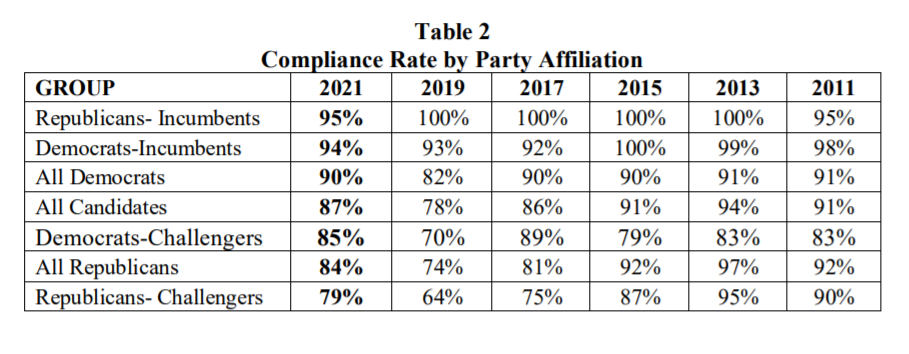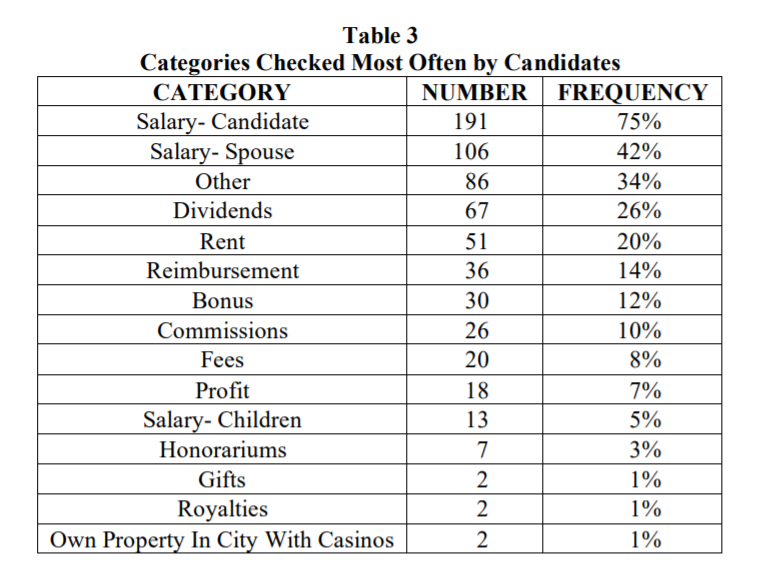ELEC: Bigger Percentage of Legislative Candidates Filed Personal Financial Disclosure Forms in 2021 than in 2019

Eighty-seven percent of candidates who campaigned for legislative seats in the June 8 primary filed
personal financial disclosure (PDFs) reports, up nine percentage points from 2019, according to an analysis by the New Jersey Election Law Enforcement Commission (ELEC).
Following a long-standing pattern, incumbents were more conscientious than challengers about submitting their reports.
Of the 108 incumbents pursuing either state Senate or Assembly seats, 102 (94%) filed their statutorily
mandated disclosure forms. That was slightly below the 95 percent compliance rate in 2019. During the best year for incumbent compliance in 2015, compliance was 100 percent.
Among the 145 challengers seeking to become state lawmakers, 117 (81%) complied with the law
requiring them to give voters a glimpse of their personal finances. That was an improvement over the 66 percent compliance rate in 2019. The best challenger compliance rate since ELEC began doing this analysis in 2011 was 90 percent in 2013.

During the current election year, Republican incumbents had the highest compliance rate at 95 percent
followed by Democratic incumbents at 94 percent. Republican challengers lagged the most at 79 percent.
Democratic challengers did better at 85 percent.
Compared to the 87 percent average for all candidates, all Democratic candidates were higher at 90 percent while all Republican candidates were lower at 84 percent.

New Jersey law requires candidates for Governor, Lieutenant Governor, the State Senate, and the
Assembly to file a seven-page personal financial disclosure reports during the year of their candidacy.
The disclosure forms ask candidates to identify sources of earned income, such as salaries or bonuses, and unearned income, such as rents and dividends. Disclosure is required if the source of income exceeds $1,000 in any one category. The statements list only sources of income, not dollar amounts. Candidates must also report sources of income received by spouses and children of candidates.
Candidates also must disclose gifts valued at more than $250, and whether they own any property in a city where casino gambling is authorized. Candidates can face fines up to $1,000 if they fail to file their PFD.

Jeff Brindle, ELEC’s Executive Director, called on the Legislature to adopt a bipartisan Commission
recommendation to move to May 15 the deadline for the filing of personal financial disclosure reports.
This year, candidates were supposed to submit these forms within 10 days after the April 1 deadline for filing primary nomination petitions. This can cause difficulties both for the candidates and ELEC.
May 15 is the same date that incumbent legislators must file separate disclosure forms with the Office of
Legislative Services. “Using the same deadline for both reports makes more sense. The filing process will be smoother and still provide disclosure well before the election,” said Brindle.
Copies of personal financial disclosure forms can be viewed by going to the “Candidate / Committee
Filing Report” search page (http://www.elec.state.nj.us/ELECReport/SearchCandidate.aspx) and entering the candidate’s name. Look for form PFD-1.
The cutoff date for the compliance checks in this report was June 10, 2021. Reports filed after that date
are not included in the totals.





